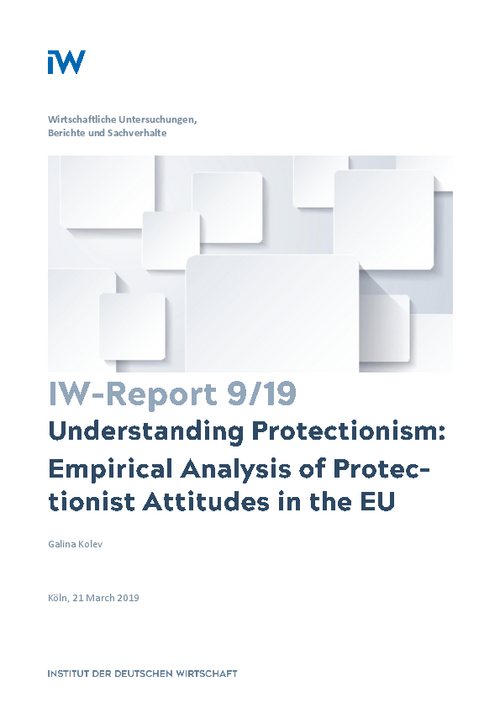A changing landscape in trade policy in recent years is undoubtedly related to changing voter preferences. Based on Eurobarometer survey data, the present paper investigates both the factors determining the level of support for protectionism and the striking inconsistency of responses to questions related to free trade and protectionism.

Understanding Protectionism: Empirical Analysis of Protectionist Attitudes in the EU
IW-Report

A changing landscape in trade policy in recent years is undoubtedly related to changing voter preferences. Based on Eurobarometer survey data, the present paper investigates both the factors determining the level of support for protectionism and the striking inconsistency of responses to questions related to free trade and protectionism.
EU citizens are more likely to support protectionism when the economy runs smoothly and rejects protectionism if the national economy is not in the best shape. Unemployment, bad economic situations as well as negative feelings regarding immigration are identified as possible reasons to call for protectionism while respondents are favouring free trade at the same time. The inconsistent attitudes toward free trade and protectionism are a matter of lacking knowledge of political issues. Better educated EU citizens are all less likely to support free trade and protectionism at the same time. This applies to respondents who show a higher level of knowledge regarding basic EU-related facts as well as to those who discuss political matters with friends more often. A possible way to tackle this problem is a broad information strategy covering the topics of international economics across several media channels. Especially radio, press and internet are identified as media which seem to contribute to a better understanding of these complex issues.

Galina Kolev: Understanding Protectionism – Empirical Analysis of Protectionist Attitudes in the EU
IW-Report

More on the topic

IW Financial Expert Survey: First Quarter 2018
The IW Financial Expert Survey for the first quarter of 2018 revealed that the surveyed experts predict, on average, higher interest rates and stock market indices, a depreciation of the Euro vis-à-vis the US Dollar, and lower oil prices by the end of the ...
IW
The Impact of Demographics on the German Retail Market
In recent years, net migration reached a new peak in Germany. Between 2011 and 2015, net migration amounted to more than 2.7 million people. This influx of people has had an impact on society, on the economy in general, and on most businesses.
IW